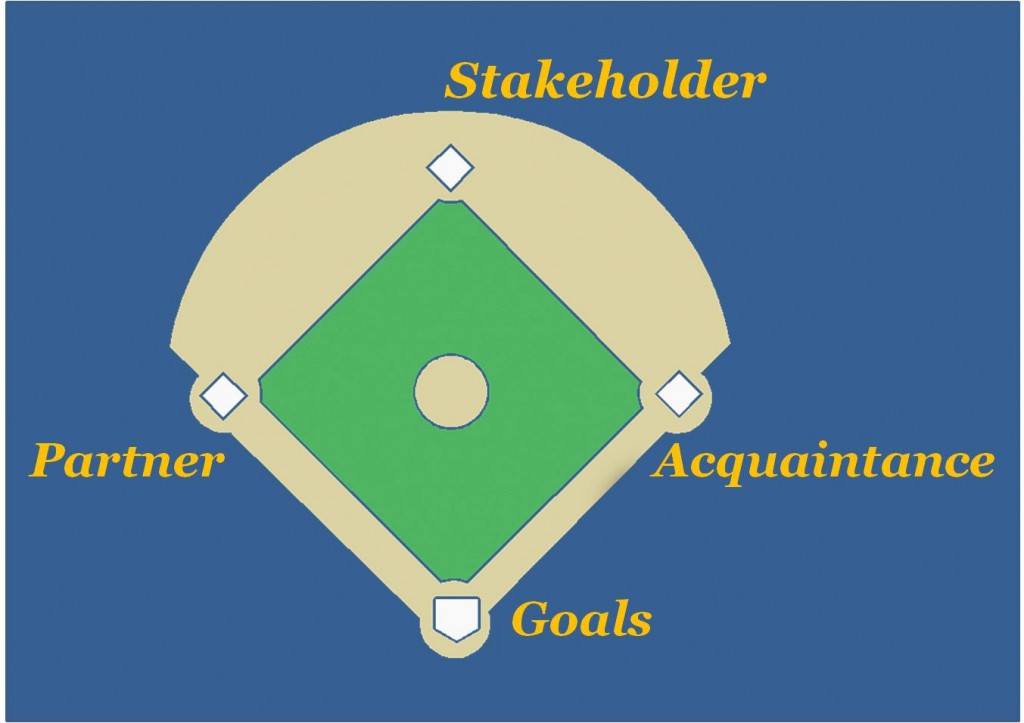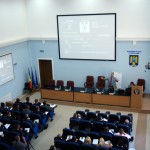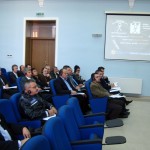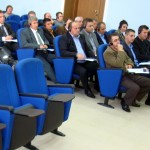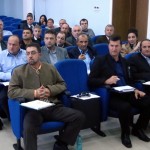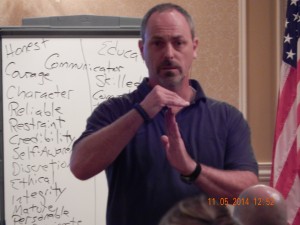Third Base in the Relationship Diamond is establishing a Partnership. But it requires mutual accountability.
Think about the Crime Watch organizations that you have been affiliated with in your law enforcement career. How many of them last past the first few meetings? Yet there are some Crime Watch groups that have been successful long term. Those are the ones that have learned to build accountability into the community policing philosophy. Mutual accountability involves us (the police) giving the citizens permission to hold us accountable. But it also requires them to give us permission to hold them accountable, a critical step in the Coactive Policing model.
Remember that accountability is the last component of the Trust Formula and must come last in the process, after establishing your integrity and opening the channels of communication and understanding. We are so quick to point the finger of accountability at others before we have invested time and effort into building the relationship first. After a trust-based stakeholdership has been established with the community, then and only then should accountability be introduced. Otherwise, the relationship will not be strong enough to withstand the stresses that are about to be placed on it, especially if we are working to “demolish” a criminal stronghold where trust of law enforcement tends to be low.
If you found this lesson helpful, please share this link through
FaceBook, LinkedIn, Twitter, or email…
Recorded at the beautiful Aventura Spa Palace in Riviera Maya, Mexico, we look at the next step in the Relationship Diamond – building a stakeholder interest.
As Sir Robert Peel said, “The police are the public and the public are the police.” But your citizens don’t necessarily see it that way. They view crime as a police problem, not a community problem, which sets them up for unrealistic expectations. Which brings us to the maxim for this dynamic:
Your community does NOT understand you. But they think they do…
That’s why open and honest communications are so important. Let me illustrate this principle with a humorous example that I have used over and over again in community settings. Imagine that you are a citizen living in a criminal stronghold. You are frustrated with the police, but know only what you have learned from TV shows, movies, and conversations with others. You watch an officer pull up in front of your house, get out of his car, and then do what all of us do when we get out of the car. He pulls his gunbelt up. Now, that is a very innocent adjustment of some uncomfortable police gear that means absolutely nothing to the officer. But it sends an entirely different message to the citizen.
Set up the example the next time you are speaking to a community group and ask them what they can already tell you about this officer and his attitude based on nothing more than their observance of his body language. Know what the citizens will say? “He’s arrogant. He’s got a bad attitude. He’s looking for trouble.” None of those things are true. But do you think the citizen’s preconceived notion about this officer and his attitude will have any impact on the contact that’s about to take place?
And the first question out of the citizen’s mouth is, “What’s the problem, officer?” Now, out of all the things that the citizen could think to ask, why do they ask this question? Because the only time you’ve EVER been there in the past, there was always a problem! This is due to the limitations of Reactive Policing.
To overcome these types of conflicts, we must initiate open and honest communications with the citizens, and in so doing, develop a stakeholder relationship where they begin to view crime as a community problem that demands a coactive, community response.
If you found this lesson helpful, please share this link through
FaceBook, LinkedIn, Twitter, or email…
While snake-hunting along the Edisto River at Givhans Ferry State Park, I paused to record the next video in the Dynamic of Relationships series.
Once we have identified the “bases” on the Relationship Diamond, the next question becomes “How do I get around the bases?” I think the answer is found in the Trust Formula. It’s our Integrity that gets us to first base. Openness gets us to second. Accountability takes us to third. And strategic Problem-solving methodologies take us home as we accomplish our Coactive Policing goals. So the Trust Formula becomes the baselines in our model of building trust-based community relationships.
Integrity is defined as “being who you represent yourself to be.” It is character and competence working in tandem. And it’s not only your actual integrity, as important as that is. It’s the other party’s perception of your integrity.
One of the quickest and easiest ways to establish your integrity in the eyes of the community is to do what you say you are going to do. As simplistic as that sounds, we often neglect a critical component of this. We get so focused on actually DOING our job, that we forget to tell the citizen what we intend to do first. If we discipline ourselves to tell them what we are going to do BEFORE we do it, we ground their expectations in reality. So instead of evaluating the effectiveness of our policing activities by their own skewed expectations, WE set the standard of law enforcement and community policing performance. This is such an important concept that I devote an entire training series, the Dynamic of Expectations, to developing it more in depth.
If you found this lesson helpful, please share this link through
FaceBook, LinkedIn, Twitter, or email…
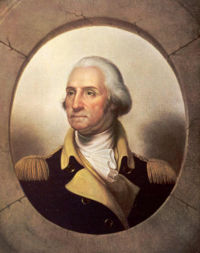 “We should never despair, our Situation before has been unpromising and has changed for the better, so I trust, it will again. If new difficulties arise, we must only put forth new Exertions and proportion our Efforts to the exigency of the times.” — George Washington, 1777
“We should never despair, our Situation before has been unpromising and has changed for the better, so I trust, it will again. If new difficulties arise, we must only put forth new Exertions and proportion our Efforts to the exigency of the times.” — George Washington, 1777
Building trust-based relationships is a complicated process and it’s easy to get lost in it if you don’t appreciate the underlying dynamics.
Filmed from my balcony at the Continental Hotel in Oradea, Romania, overlooking the Repide River, I use the Relationship Diamond as a model for understanding the process of building community relationships.
There are essentially four steps in building a working community relationship and you must progress through them in order, just like running the bases in a baseball game. First base is to become an Acquaintance. This is a bit common sensical but it is a necessary first step.
To get to second base, the citizen must become a Stakeholder. That is, they must see themselves as having a vested interest in the crime-fighting process. As Sir Robert Peel said, “The police are the public and the public are the police.” But the citizens don’t often think of themselves in that way. They tend to see crime as exclusively a police problem, not a community problem.
Third base is Partnership. This is a working relationship where the police and the community team up to coactively solve problems that are manifesting themselves as crime, fear of crime, and neighborhood decay. After reaching the partnership level, the group is now ready to head to home by accomplishing some of their coactive policing goals; two of which are establishing safe and peaceful neighborhoods; and stable and successful families.
If you found this lesson helpful, please Share the Knowledge…
This first installment of the Dynamic of Relationships series was filmed inside the Bear Cave in Bihor County, Romania, in that region known as Transylvania (so appropriate this close to Halloween). The lighting in the cave was poor, so please excuse the poor video quality.
Trust is the foundation for effective relationships and community trust is essential for effective policing. It is the fuel that drives a Coactive Policing effort forward and consists of three elements:
The Trust Fomula
Integrity + Openness + Accountability
Our simplified definition of integrity is “being who you represent yourself to be” — otherwise stated as your character and competence operating in tandem.
Openness has to do with honest and open communication — essential for building trust. Keep this in mind, your community does NOT understand you… but it THINKS it does! So you must take the initiative to break down the barriers to communication.
Accountability is a two-way street. The police must be willing to give the community permission to hold them accountable, but the community must also give the police permission to hold them accountable as well.
When we were in grade school we learned that there was a property of addition that allowed you to add a series of numbers in any order and still get the same result. It doesn’t work that way with the Trust Formula, for reasons that we will see later. The three factors necessarily must come in this order: Integrity, Openness, and Accountability or the process will fail.
If you found this lesson helpful, please Share the Knowledge…
The Wounded Spirit is the one who always gets his feelings hurt…and over some of the silliest things! In our first video in the Dynamic of Restoration series, we learned that a person out from under authority has learned to deflect the truth by assigning blame to others. So it is easy for them to develop a Wounded Spirit that can only be cured by developing the character quality of Forgiveness…
FORGIVENESS
Clearing the record of wrongs and refusing to hold a grudge
This is perhaps the most difficult character quality of all because it absolutely goes against our human nature. Yet, just like Attentiveness is the key to learning, Forgiveness is the key to restoring relationships.
The “brotherhood” of law enforcement is somewhat unique in that we are willing to lay down our lives for our fellow officers…even if we don’t like them very much! “No greater love hath a man than this, that he is willing to lay down his life for his friend…” Doesn’t this give us the basis for a relationship? Yet so many of us continue to hold grudges. But forgiveness is such a better option for everyone.
Don’t confuse forgiveness with pardon, however. Forgiveness is about restoring a relationship, not necessarily absolving someone of the consequences of their behavior.
Level 1 Forgiveness is when you are willing to forgive someone who has wronged you if they come to you in a genuine spirit of repentance and say the seven hardest words to say in the English language: “I was wrong. Will you forgive me?” Many of us would be willing to forgive the person if they came to us in that manner and we really perceived they were sincere. As hard as THAT is, Level 2 Forgiveness is much more difficult. That’s when you just make a decision to forgive the person even if they never ask…! Or would you prefer to continue to drink the cup of bitterness…? It’s up to you…
If you found this lesson helpful, please share it with others by clicking
one of the Share the Knowledge buttons below…
This month I had the wonderful opportunity to return to Romania to do some Police Dynamics training at the invitation of their National Police. This was my third trip there, but the first one in over 13 years! What a lot of positive changes…
I had the privilege of training members of the Romanian National Anti-drug Agency as well as the National Police stationed in Bihor County near the western border with Hungary. And, yes, that IS in Transylvania…!
Here is a collection of photos you might find interesting…
- My interview on Romanian TV with Camelia and Mihalea
- My interview on Romanian TV with Camelia and Mihalea
- Police Dynamics Training in Bihor County
- My colleagues from the Romanian Anti-Drug Agency, Dorel and Lucia
- Members of Bihor the County Police at Police Dynamics Training
- Members of Bihor the County Police at Police Dynamics Training
- My most excellent host, Liviu Popa, Chief of Bihor County Police
- Director of the Romanian Anti-Drug Agency
- My hosts in Oradea, Chief Popa and Mihalea
- Bihor County Police at Police Dynamics Training
- Bihor County Police at Police Dynamics Training
- My colleagues from the Anti-Drug Agency at Starbucks: Lucia, Catalin, Luisa, and Dorel
Recently I posted an interview I did on Romanian TV when I visited Oradea. The host, Camelia Pascui, sent me an email that contained some questions from her viewers. I thought you might enjoy my responses to her. Incidentally, the title of the original post was “Why Do Americans Eat Every Cop Donuts?” This was the translation of their website rendered by the Google translation software. I used it to attract viewers to the site. It in no way reflects the quality of the translation that was provided by Mihalea Pop. Quite the contrary. She did a most excellent job…!
Question 1: What are the methods used by American police officers for reducing professional stress and if you are aware of these issues of Romanian police officers regarding this?
My response: Many police officers use physical exercise as a way of reducing stress. It is also important to spend time doing positive activities that are not work-related, particularly if it includes spending time with their families. An overall wellness program that includes exercise, a healthy diet, and adequate rest and recreation are important. Some police agencies in America refer officers to psychologists if they are having certain types of stress-related problems, such as Post Traumatic Stress Disorder, after they are involved in a violent incident, such as shooting a suspect, or experience some other type of traumatic event. In recent years, we have implemented a program called Critical Incident Stress Debriefings where a psychologist or a team of specially trained police officers will meet in a group or individually with officers who have been exposed to stressful incidents such as the murder or suicide of a colleague. I believe that all of these programs are beneficial, but I also believe that officers with strong character are better able to keep their lives in balance and deal with the stresses of law enforcement.
These two terms are often misunderstood to mean the same thing. They rhyme, but that’s about all they have in common. Meekness means power under the control of character. In Part 3 of the Dynamic of Restoration we look at Meekness as the critical character quality for restoring the Bitter Spirit.
Meekness
Yielding my personal rights and expectations with a desire to serve others
Why do we get mad? Usually it’s because we perceive that someone else has violated one of our personal rights. Whether they cut us off in traffic, steal “our” parking space, or cut in line at the grocery store, we tend to get mad because we perceive they have stepped on one of our rights. If they cut in line behind us, we don’t get mad. We think that’s funny because now they have stepped on someone else’s rights!
A meek person has learned to yield his “rights” to emotional, sensual, and material satisfaction (read that anger, lust, and greed – the three root character flaws) and be released from the accompanying anger and bitterness.

